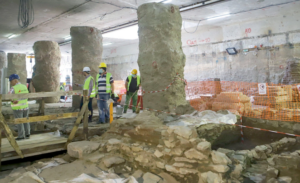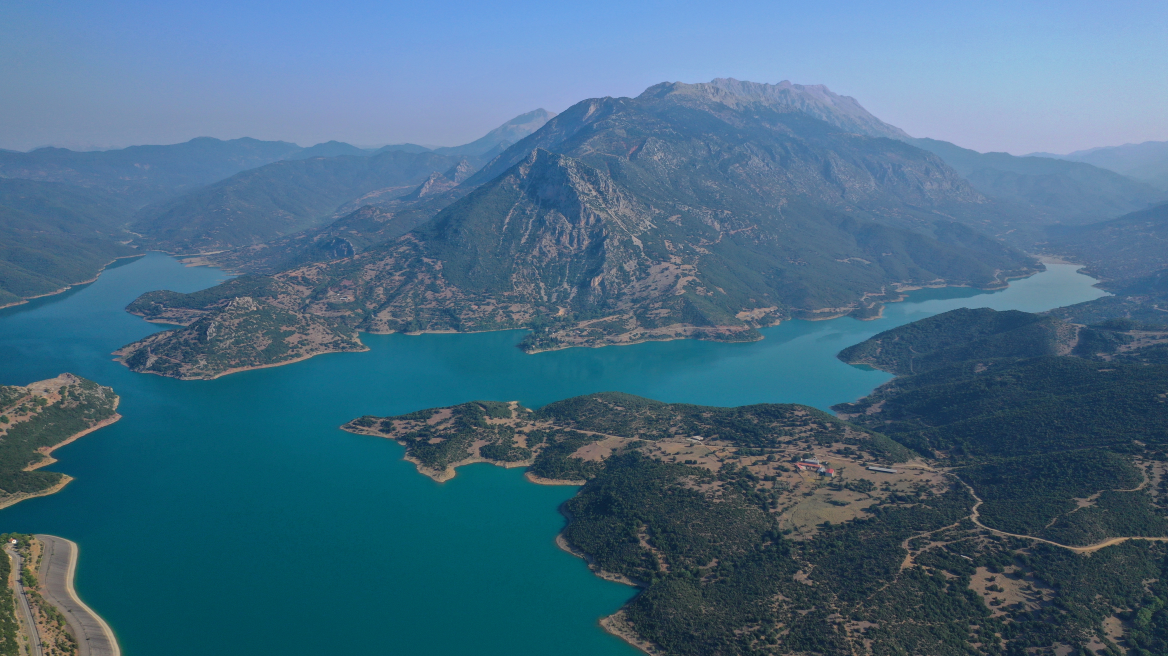A seemingly invisible curse seems to haunt almost all major projects in Thessaloniki, which have faced countless obstacles and caused anguish for the city’s residents for the past many years – for instance the city’s metro some, the underwater artery. Common ground in these cases is the flood of legal appeals from communities, entities, and alleged collective bodies which have only added to further complicate each project.
It’s a well known problem throughout Greece and even more so in Thessaloniki where the dimensions of these issues are unprecedented. It’s an integral part of the city where a culture of appeals has emerged. Therefore, each time a new project begins to launch appeals come in front, left, right and center to cause its delay as a means to undermine, derail , or even cancel it. Within genuine sensitivity, concern, and response on one hand, and deliberate, ideological fixations, and stubborn denials for anything progressive, upbeat to elevate the live’s of the people of Thessaloniki, where is the silver lining when it comes to a happy city in comparison to a city “bleeding”itself for decades.
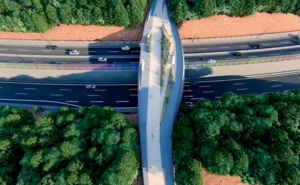
Delays
Suspension of works on the Flyover due to the temporary decision of the Council of State has raised eyebrows throughout Greece and particularly Thessaloniki where appeals have become the norm. Clashes with setbacks by systemic agencies and issues with collective entities, ad-hoc resident communities, or individuals who believe that their rights or interests are being hindered engage in delaying each project preventing Greece’s second largest city from powering forward.
There is no similar precedent anywhere that can compare to Thessaloniki’s unprecedented issues of delays with regards to important infrastructure projects, communities which include groups of citizens, archaeologists, local associations, ecologists, the Ornithological Society, and even the church who are responsible! No importance is given to scientific opinions coming from universities, institutes, research organisations, all relevant experts for the sustainable execution of these projects. There cannot be an ‘industry of appeals’ that can cancel everything.
A lawsuit by those who believe have a legal interest is enough, even when they are not specialists but simply locals with small interests that are either personal or reflect their communicates as well as their bias outlooks which are more than enough to block the project for months at best, for years at most and forever at worst.
Respective governments also have their own historical responsibilities for inadequate preparations of tenders for certain projects, something that provides a pretext (or even an alibi) for these legal actions.
New Democracy’s unity, Kyriakos Mitsotakis on tour to strengthen party’s presence
The new appointment with the Council of State
Just when it seemed things were beginning to get better the customary meeting of citizen groups and some organisations with the Council of State yielded results again with a halt to the works for the Flyover. Once again, the same familiar story. We’re talking about a project for relieving the city’s traffic congestion, hence improving environmental conditions and consequently the quality of life for residents and visitors. A technically challenging and demanding project that will modernise the current eastern inner ring road by 12 km, with the construction of an elevated expressway of 7.6 km over the current eastern inner ring road, which will include a 4 km bridge.
For the record, the Association of Residents of Konstantinoupolis, the Sheikh Sou Protection Association, and the Thessaloniki Health Runners Association have appealed to the Supreme Court of Administrative Justice, arguing that the works will cause irreparable damage to the forest due to drilling on the banks of the Malakopi stream, resulting in the destruction of the ecosystem and the risk of flooding in case of severe weather phenomena.
The ‘glorious’ past
Thessaloniki’s track record of appeals is unfortunately illustrious. Citizens’ and organisations’ appeals for the project of the underwater artery almost hit rock bottom. Then came the metro where appeals have been railing in since 2006.
A special case is the church with regards to the Papafi station. The management of the foundation approved the free disposal of the requested area in December 2004, estimating huge in the city’s benefit and its people as a whole.’ However, in February 2008, it returned and raised the issue of compensatory benefits. Negotiations began for the amount of compensation, which seemed to sum up to 10 million euros, not in cash but in the form of work. Attiko Metro SA would cover the expenses for the renovation of Papafi. However, this agreement did not progress. The Karamanlis government bequeathed it to the next administration that of George Papandreou, and the management of Papafi, under the then-Metropolitan Anthimos who appealed to the Council of State on March 31, 2010 seeking to block 900 sqm area.
This pending matter delayed a series of works, with the metro trains remaining immobile for 18 months. Eventually, faced with the possibility of the Papafi station being abolished, Anthimos backed down. A tripartite agreement was reached (municipality – foundation – Attiko Metro) for the immediate construction of the station, which, however, was delayed again due to appeals with objections to the land concession. The construction site of the Thessaloniki metro at Papafi station opened on October 22, 2012.
At the same time, the adventure of the Venizelos station with the ancient ruins began. Repeated appeals to the Council of State, starting from the municipality, under the administration of Butaris in 2014, and along the way by communities, citizens’ initiative committees with… as their main concern the fate of the ancient ruins at the station. Contradictory choices from the state’s side under Ministers of Culture Kostas Tzavaras (under Samaras) and Aristides Baltas (SYRIZA) for the management of the issue, first for removal and transfer, then for the preservation of the ruins (on-site) with the parallel development of the station, and then returning to the first option, completely disrupting the project. In 2016, the Council of State rejected the appeals.
The whole affair evolved into an ongoing legal dispute with protagonists the municipality and bodies such as the Citizens’ Movement for the Protection of Cultural Heritage, the Archaeologists’ Association, the Hellenic Society for the Environment and Culture, the Christian Archaeological Society.
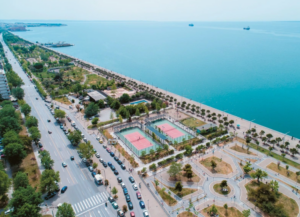
A new request for annulment to the Council of State and during the tenure of Lina Mendoni by the aforementioned bodies and actions on July 20, 2020, a new rejection by the Supreme Court on April 29, 2021, a new appeal on September 9, 2021, with interim measures by 304 citizens, asking for the cessation of works for the removal of the ancient ruins, citing ‘violation of their personality’. Naturally, this resulted in a new delay in the delivery of the project. In January 2022, the Council of State gave the green light for the continuation and completion of the removal of the ancient ruins from Venizelos station, rejecting the request of citizens and communities to freeze the works, estimating that this process would not cause irreparable damage to the ruins.
Reconstructions
Similar fates had the projects for the redevelopment of the New Waterfront of Thessaloniki by architects Prodromos Nikiforidis and Bernar Cuomo, which unanimously won the Architectural Award for the period 2004-2008 from the Hellenic Institute of Architecture, and was included among the candidate projects for the Mies Van der Rohe Award. However, 200 residents of the area argued that the artificial hill proposed in the architectural study of the project would obstruct their view of the sea, have an environmental impacts, and would reduce the commercial value of their apartments. A similar appeal to the Council of State was made by the Citizens’ Movement for the Development of the Thessaloniki International Exhibition Center for a Sustainable Thessaloniki against the planned redevelopment project of the exhibition space.
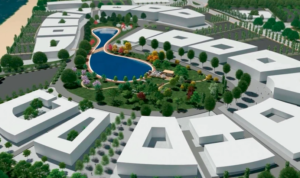
Unbelievable Scenes
Unbelievable scenes of delays due to appeals have also occurred with waste management projects with the two largest ones which would relieve 1 million people. For the Mavrorachi Landfill, it took 19 years of judicial conflicts at the CoS. After nine trials, work finally started in June 2008. The same happened with the New Efkarpia Waste Transfer Station.
No exception was even the country’s first green and smart park of innovation, Thess INTEC. The first Strategic Environmental Impact Assessment (SEA) which was rejected in October 2022. This was followed by the revised one, which was challenged by the Hellenic Ornithological Society, claiming that the wetland of Elous in Peraia was not adequately protected. The appeal was rejected a year and a half later.
Ask me anything
Explore related questions
